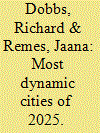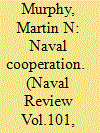| Srl | Item |
| 1 |
ID:
115844


|
|
|
| 2 |
ID:
128667


|
|
|
|
|
| Publication |
2013.
|
| Summary/Abstract |
The author, a senior fellow of the Atlantic Council in Washington, DC and vising fellow at the Corbett centre for Maritime Policy studies, King's college, London, examines the idea of cooperation between the Anglophone navies to compensate for the declining strength of each of theme individually. He looks beyond comforting language about cooperation to what it might mean on the ground in real in real material terms. An earlier version of this article was published by the Atlantic Council and Rusi in September 2012.
In the unrelenting struggle of peoples, those ascendant at sea have, at least in the modern era, proved consistently successful either singly or in alliance against those with a territorial power base- Peter Padfield.
|
|
|
|
|
|
|
|
|
|
|
|
|
|
|
|
| 3 |
ID:
130923


|
|
|
|
|
| Publication |
2014.
|
| Summary/Abstract |
This paper explores a number of success stories of scholar-practitioner interactions on issues such as democracy promotion, fostering economic development, reducing extreme income inequality, and foreign policymaking toward the United States, among others, to argue that the so-called scholar-practitioner gap in International Relations might not be as wide as it may seem. It also highlights some of the salient limits to effective relations between the worlds of ideas and policy, and it discusses the main transmission belts-both individual and institutional-through which scholarly outputs influence the different stages of policymaking. The paper closes by proposing a number of "best practices" to enhance effective scholar-practitioner relations in inter-American affairs and beyond, including tying research to significant world events, synthesizing research findings into digestible components, developing relations of trust with allies in government, providing concrete policy recommendations based on rigorous research and cost-effectiveness analyses, and integrating practitioners into academic departments, among others.
|
|
|
|
|
|
|
|
|
|
|
|
|
|
|
|